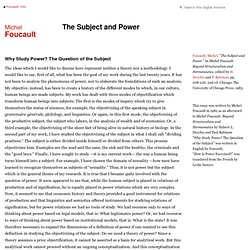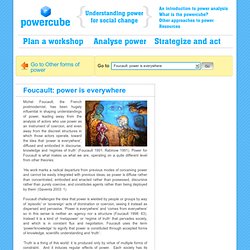

Image of power. Definition of power by Foucault 1982. Why Study Power?

The Question of the Subject The ideas which I would like to discuss here represent neither a theory nor a methodology. I would like to say, first of all, what has been the goal of my work during the last twenty years. Website on power by Sussex University. Michel Foucault, the French postmodernist, has been hugely influential in shaping understandings of power, leading away from the analysis of actors who use power as an instrument of coercion, and even away from the discreet structures in which those actors operate, toward the idea that ‘power is everywhere’, diffused and embodied in discourse, knowledge and ‘regimes of truth’ (Foucault 1991; Rabinow 1991).

Power for Foucault is what makes us what we are, operating on a quite different level from other theories: ‘His work marks a radical departure from previous modes of conceiving power and cannot be easily integrated with previous ideas, as power is diffuse rather than concentrated, embodied and enacted rather than possessed, discursive rather than purely coercive, and constitutes agents rather than being deployed by them’ (Gaventa 2003: 1) ‘Truth is a thing of this world: it is produced only by virtue of multiple forms of constraint.
And it induces regular effects of power.